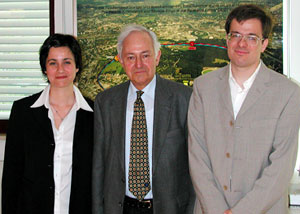URL: https://www.desy.de/news/news/archive_before_2010/2003/desy_2205/index_eng.html
Breadcrumb Navigation
Young Scientists Honored
Good news for two up-and-coming scientists at HERA: This year’s Ph.D. Thesis Prize goes to Dr. Lara De Nardo and Dr. Oscar González López for their work carried out at the HERA particle accelerator. This is the ninth time that the Association of the Friends and Sponsors of DESY presents the award for an excellent Ph.D. thesis covering research at DESY. The chairman of the Association, Prof. Erich Lohrmann, presented the prize during the open session of the Extended Scientific Council in Zeuthen on Thursday, May 22.

from left: Dr. Lara De Nardo, Prof. Erich Lohrmann, Dr. Oscar González López
Lara De Nardo from the University of Alberta received the prize for her thesis “Measurement of the Structure Function g1e at HERMES and Extraction of Polarized Parton Distributions” carried out at the HERMES experiment at HERA. With this work, she made significant contributions to solving a long-time riddle, the so-called spin puzzle of the proton: As far as we know today, the proton is mainly composed of three quarks. The intrinsic angular momentum – the spin – of the proton should thus be generated by these three quarks. However, measurements with polarized particle beams have shown that these quarks contribute only a fraction of the proton’s spin. Where thus does the spin of the proton come from? On the basis of her measurement of the spin structure function of the deuteron – the most precise so far – Lara De Nardo carried out a very impressive theoretical analysis of all previous measurements. She came to the conclusion that the gluons, which hold the quarks together inside the proton, very probably contribute a large positive amount to the spin of the proton. This result represents a major step towards the solution of the old spin puzzle.
Oscar González López from the Universidad Autonoma de Madrid wrote an excellent thesis on “Precise determinations of the Strong Coupling Constant at HERA”. At the ZEUS experiment at HERA, he carried out a new, very precise measurement of the coupling constant of the strong interaction. This is the most precise measurement of the sort ever accomplished at HERA, and it required considerable experimental skill for the extraction of the data as well as a full mastery of the theoretical bases. This measurement is very important because the coupling constant of the strong interaction is one of the four universal constants which govern the strengths of the four forces of nature. Measurements carried out with similar precision using completely different methods at other research institutions all agree with the value determined by Oscar González López. His work provides a new, very precise and methodically “clean” verification of the modern theory of the strong interaction, quantum chromodynamics.


